Assessment 4: Accor Hotels Case Study on Front Office Operations
VerifiedAdded on 2022/09/17
|13
|3047
|36
Report
AI Summary
This case study report examines the front office operations and room division responsibilities within Accor Hotels, comparing the luxury Sofitel brand with the budget-friendly Ibis Budget. The report explores the differences in service execution, communication channels, and target markets for each brand. It delves into the specific needs and expectations of customers, analyzing current strategies for ensuring quality service and identifying additional strategies to increase customer satisfaction. The study covers key aspects like front office operations, guest satisfaction, and the impact of various communication tools. The report highlights operational differences, customer service strategies, and the importance of adapting to customer expectations in both luxury and budget hotel settings. It concludes with a review of brand-specific strategies aimed at enhancing customer experience.
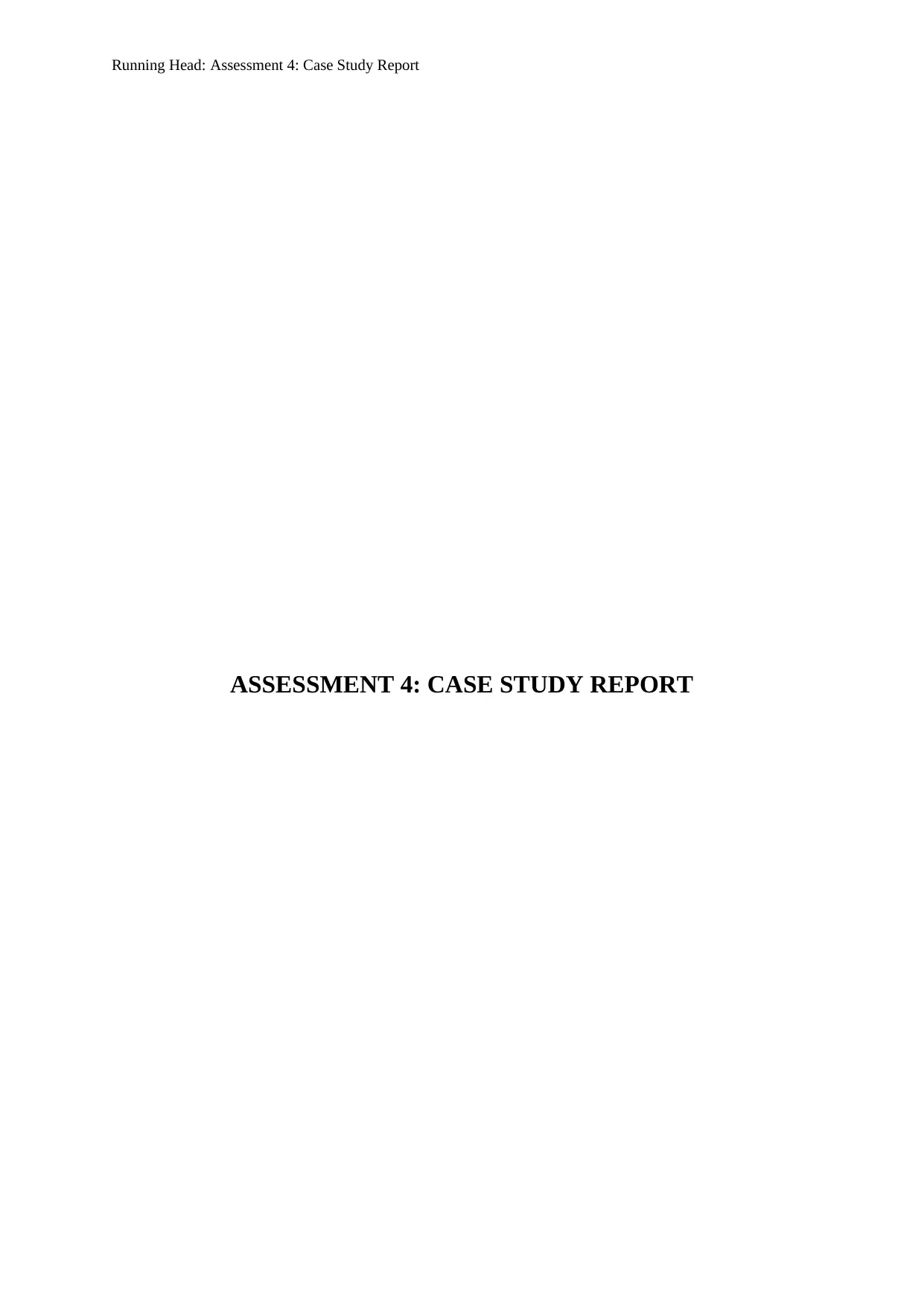
Running Head: Assessment 4: Case Study Report
ASSESSMENT 4: CASE STUDY REPORT
ASSESSMENT 4: CASE STUDY REPORT
Paraphrase This Document
Need a fresh take? Get an instant paraphrase of this document with our AI Paraphraser
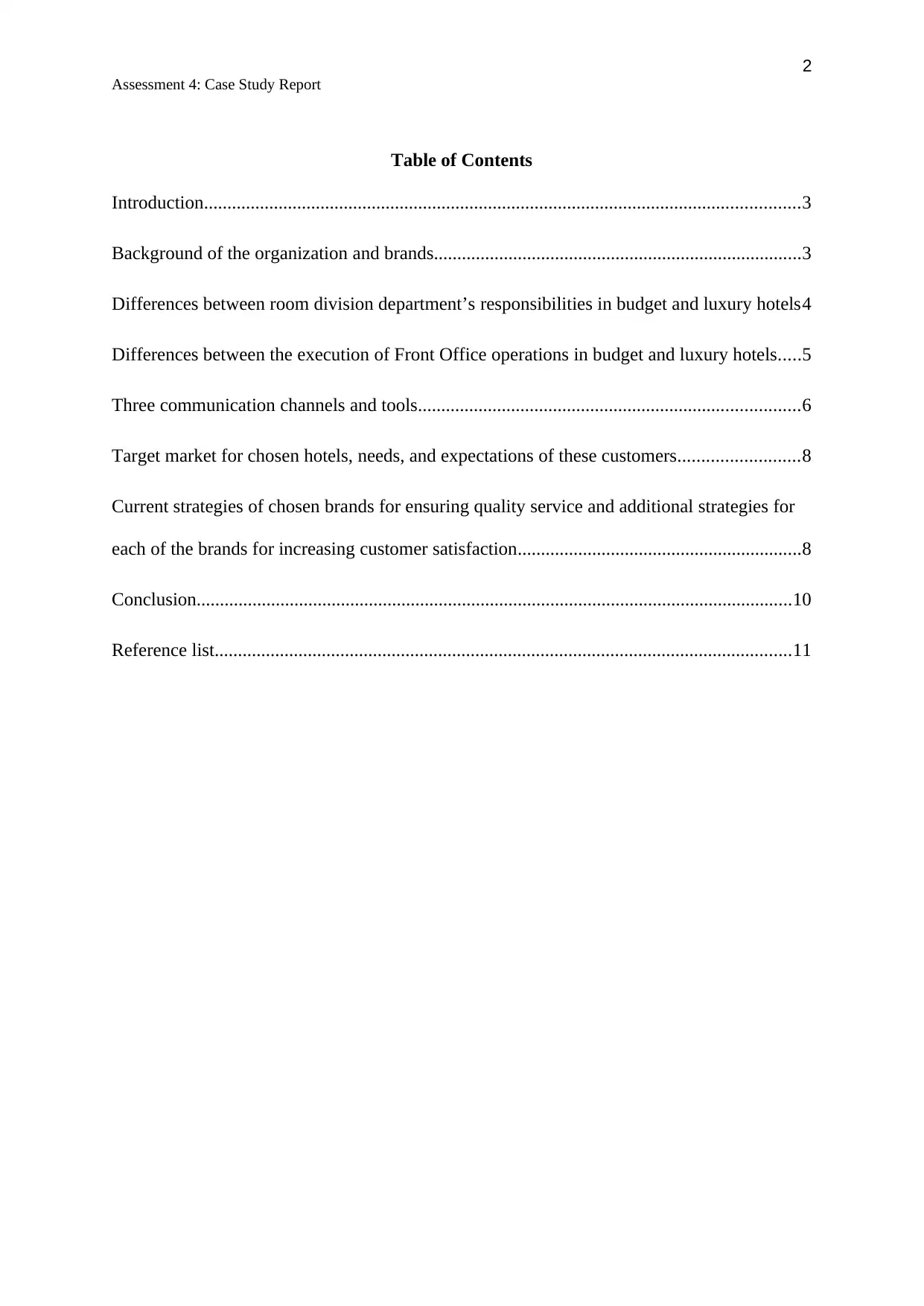
2
Assessment 4: Case Study Report
Table of Contents
Introduction................................................................................................................................3
Background of the organization and brands...............................................................................3
Differences between room division department’s responsibilities in budget and luxury hotels4
Differences between the execution of Front Office operations in budget and luxury hotels.....5
Three communication channels and tools..................................................................................6
Target market for chosen hotels, needs, and expectations of these customers..........................8
Current strategies of chosen brands for ensuring quality service and additional strategies for
each of the brands for increasing customer satisfaction.............................................................8
Conclusion................................................................................................................................10
Reference list............................................................................................................................11
Assessment 4: Case Study Report
Table of Contents
Introduction................................................................................................................................3
Background of the organization and brands...............................................................................3
Differences between room division department’s responsibilities in budget and luxury hotels4
Differences between the execution of Front Office operations in budget and luxury hotels.....5
Three communication channels and tools..................................................................................6
Target market for chosen hotels, needs, and expectations of these customers..........................8
Current strategies of chosen brands for ensuring quality service and additional strategies for
each of the brands for increasing customer satisfaction.............................................................8
Conclusion................................................................................................................................10
Reference list............................................................................................................................11
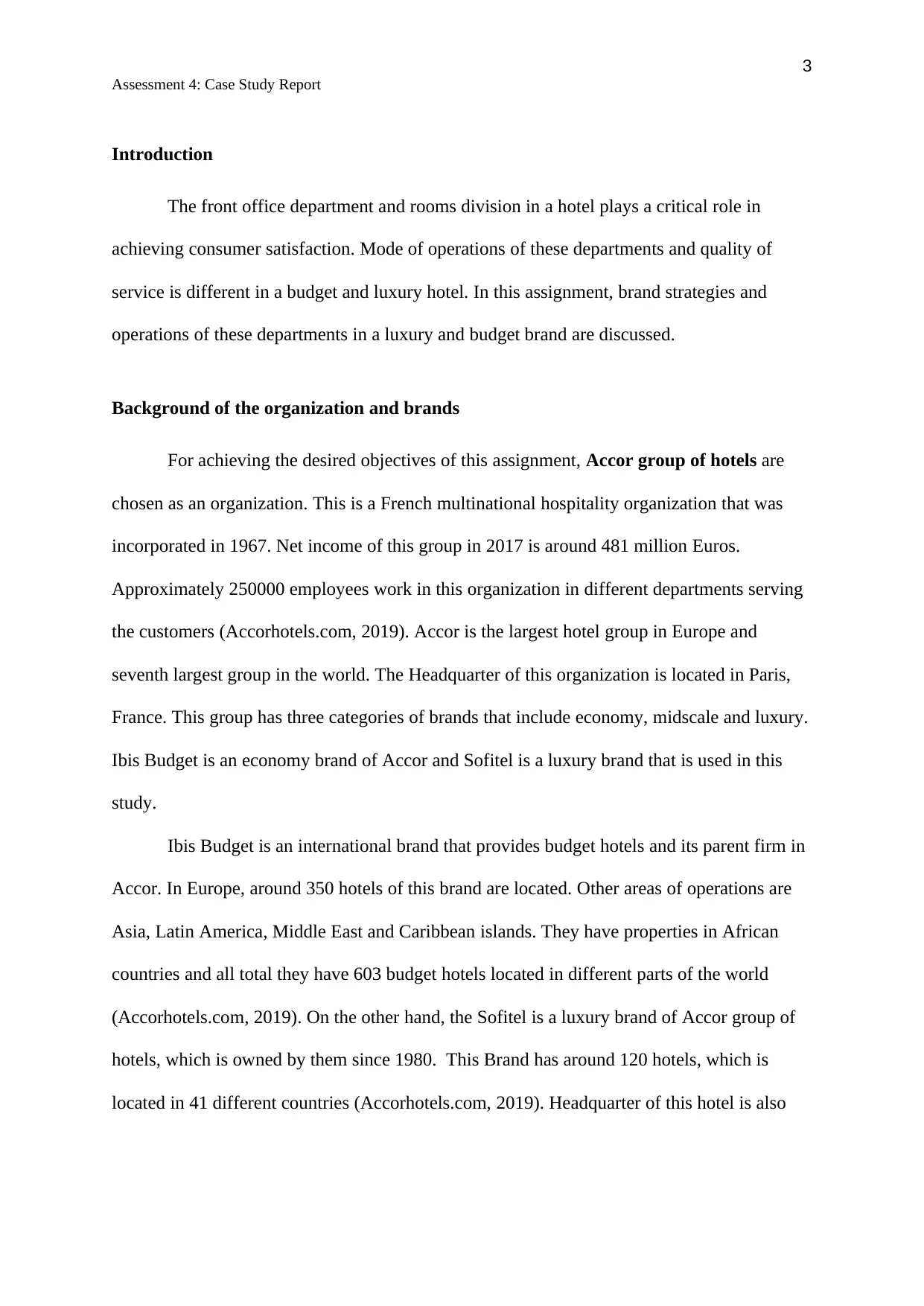
3
Assessment 4: Case Study Report
Introduction
The front office department and rooms division in a hotel plays a critical role in
achieving consumer satisfaction. Mode of operations of these departments and quality of
service is different in a budget and luxury hotel. In this assignment, brand strategies and
operations of these departments in a luxury and budget brand are discussed.
Background of the organization and brands
For achieving the desired objectives of this assignment, Accor group of hotels are
chosen as an organization. This is a French multinational hospitality organization that was
incorporated in 1967. Net income of this group in 2017 is around 481 million Euros.
Approximately 250000 employees work in this organization in different departments serving
the customers (Accorhotels.com, 2019). Accor is the largest hotel group in Europe and
seventh largest group in the world. The Headquarter of this organization is located in Paris,
France. This group has three categories of brands that include economy, midscale and luxury.
Ibis Budget is an economy brand of Accor and Sofitel is a luxury brand that is used in this
study.
Ibis Budget is an international brand that provides budget hotels and its parent firm in
Accor. In Europe, around 350 hotels of this brand are located. Other areas of operations are
Asia, Latin America, Middle East and Caribbean islands. They have properties in African
countries and all total they have 603 budget hotels located in different parts of the world
(Accorhotels.com, 2019). On the other hand, the Sofitel is a luxury brand of Accor group of
hotels, which is owned by them since 1980. This Brand has around 120 hotels, which is
located in 41 different countries (Accorhotels.com, 2019). Headquarter of this hotel is also
Assessment 4: Case Study Report
Introduction
The front office department and rooms division in a hotel plays a critical role in
achieving consumer satisfaction. Mode of operations of these departments and quality of
service is different in a budget and luxury hotel. In this assignment, brand strategies and
operations of these departments in a luxury and budget brand are discussed.
Background of the organization and brands
For achieving the desired objectives of this assignment, Accor group of hotels are
chosen as an organization. This is a French multinational hospitality organization that was
incorporated in 1967. Net income of this group in 2017 is around 481 million Euros.
Approximately 250000 employees work in this organization in different departments serving
the customers (Accorhotels.com, 2019). Accor is the largest hotel group in Europe and
seventh largest group in the world. The Headquarter of this organization is located in Paris,
France. This group has three categories of brands that include economy, midscale and luxury.
Ibis Budget is an economy brand of Accor and Sofitel is a luxury brand that is used in this
study.
Ibis Budget is an international brand that provides budget hotels and its parent firm in
Accor. In Europe, around 350 hotels of this brand are located. Other areas of operations are
Asia, Latin America, Middle East and Caribbean islands. They have properties in African
countries and all total they have 603 budget hotels located in different parts of the world
(Accorhotels.com, 2019). On the other hand, the Sofitel is a luxury brand of Accor group of
hotels, which is owned by them since 1980. This Brand has around 120 hotels, which is
located in 41 different countries (Accorhotels.com, 2019). Headquarter of this hotel is also
⊘ This is a preview!⊘
Do you want full access?
Subscribe today to unlock all pages.

Trusted by 1+ million students worldwide
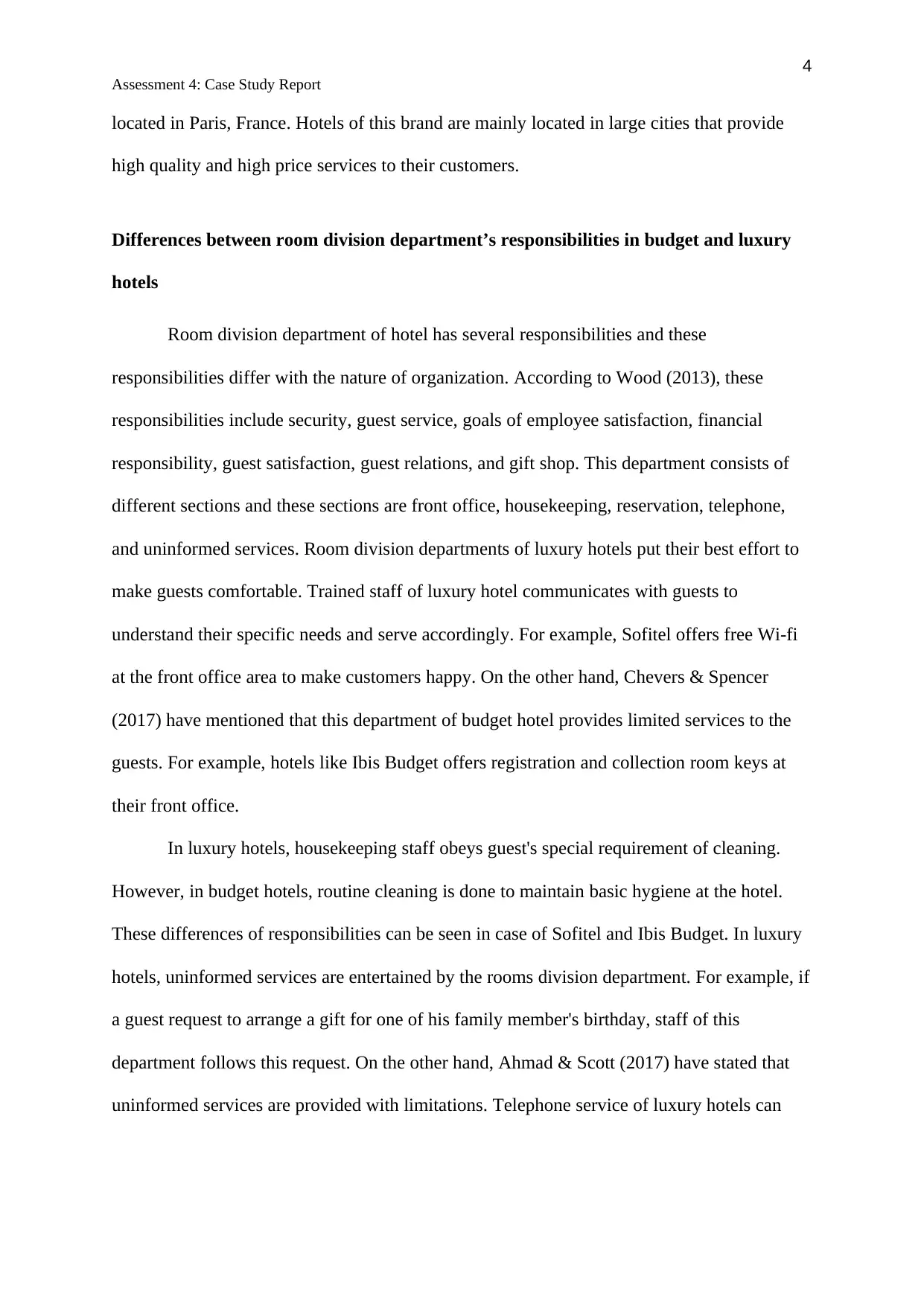
4
Assessment 4: Case Study Report
located in Paris, France. Hotels of this brand are mainly located in large cities that provide
high quality and high price services to their customers.
Differences between room division department’s responsibilities in budget and luxury
hotels
Room division department of hotel has several responsibilities and these
responsibilities differ with the nature of organization. According to Wood (2013), these
responsibilities include security, guest service, goals of employee satisfaction, financial
responsibility, guest satisfaction, guest relations, and gift shop. This department consists of
different sections and these sections are front office, housekeeping, reservation, telephone,
and uninformed services. Room division departments of luxury hotels put their best effort to
make guests comfortable. Trained staff of luxury hotel communicates with guests to
understand their specific needs and serve accordingly. For example, Sofitel offers free Wi-fi
at the front office area to make customers happy. On the other hand, Chevers & Spencer
(2017) have mentioned that this department of budget hotel provides limited services to the
guests. For example, hotels like Ibis Budget offers registration and collection room keys at
their front office.
In luxury hotels, housekeeping staff obeys guest's special requirement of cleaning.
However, in budget hotels, routine cleaning is done to maintain basic hygiene at the hotel.
These differences of responsibilities can be seen in case of Sofitel and Ibis Budget. In luxury
hotels, uninformed services are entertained by the rooms division department. For example, if
a guest request to arrange a gift for one of his family member's birthday, staff of this
department follows this request. On the other hand, Ahmad & Scott (2017) have stated that
uninformed services are provided with limitations. Telephone service of luxury hotels can
Assessment 4: Case Study Report
located in Paris, France. Hotels of this brand are mainly located in large cities that provide
high quality and high price services to their customers.
Differences between room division department’s responsibilities in budget and luxury
hotels
Room division department of hotel has several responsibilities and these
responsibilities differ with the nature of organization. According to Wood (2013), these
responsibilities include security, guest service, goals of employee satisfaction, financial
responsibility, guest satisfaction, guest relations, and gift shop. This department consists of
different sections and these sections are front office, housekeeping, reservation, telephone,
and uninformed services. Room division departments of luxury hotels put their best effort to
make guests comfortable. Trained staff of luxury hotel communicates with guests to
understand their specific needs and serve accordingly. For example, Sofitel offers free Wi-fi
at the front office area to make customers happy. On the other hand, Chevers & Spencer
(2017) have mentioned that this department of budget hotel provides limited services to the
guests. For example, hotels like Ibis Budget offers registration and collection room keys at
their front office.
In luxury hotels, housekeeping staff obeys guest's special requirement of cleaning.
However, in budget hotels, routine cleaning is done to maintain basic hygiene at the hotel.
These differences of responsibilities can be seen in case of Sofitel and Ibis Budget. In luxury
hotels, uninformed services are entertained by the rooms division department. For example, if
a guest request to arrange a gift for one of his family member's birthday, staff of this
department follows this request. On the other hand, Ahmad & Scott (2017) have stated that
uninformed services are provided with limitations. Telephone service of luxury hotels can
Paraphrase This Document
Need a fresh take? Get an instant paraphrase of this document with our AI Paraphraser
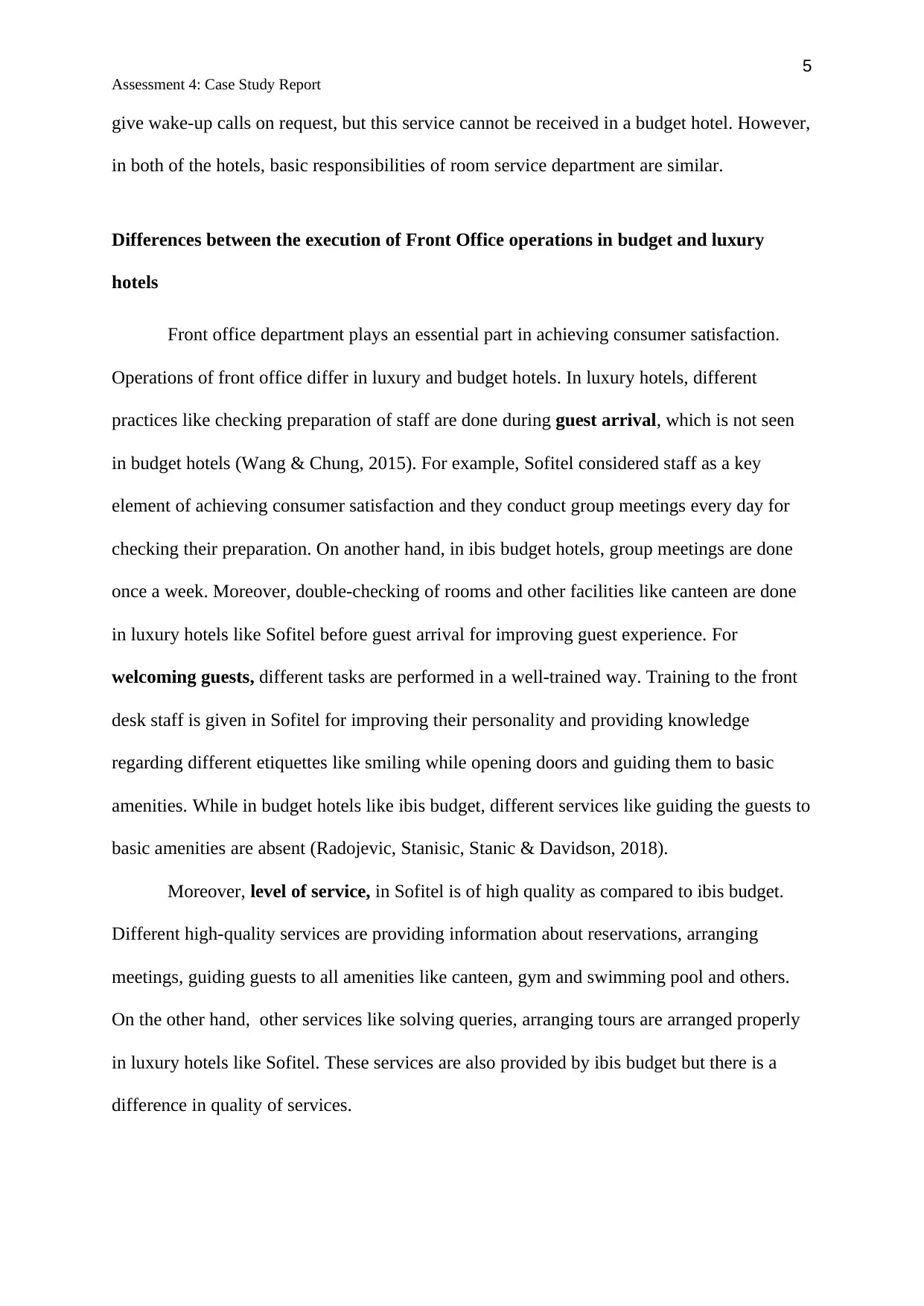
5
Assessment 4: Case Study Report
give wake-up calls on request, but this service cannot be received in a budget hotel. However,
in both of the hotels, basic responsibilities of room service department are similar.
Differences between the execution of Front Office operations in budget and luxury
hotels
Front office department plays an essential part in achieving consumer satisfaction.
Operations of front office differ in luxury and budget hotels. In luxury hotels, different
practices like checking preparation of staff are done during guest arrival, which is not seen
in budget hotels (Wang & Chung, 2015). For example, Sofitel considered staff as a key
element of achieving consumer satisfaction and they conduct group meetings every day for
checking their preparation. On another hand, in ibis budget hotels, group meetings are done
once a week. Moreover, double-checking of rooms and other facilities like canteen are done
in luxury hotels like Sofitel before guest arrival for improving guest experience. For
welcoming guests, different tasks are performed in a well-trained way. Training to the front
desk staff is given in Sofitel for improving their personality and providing knowledge
regarding different etiquettes like smiling while opening doors and guiding them to basic
amenities. While in budget hotels like ibis budget, different services like guiding the guests to
basic amenities are absent (Radojevic, Stanisic, Stanic & Davidson, 2018).
Moreover, level of service, in Sofitel is of high quality as compared to ibis budget.
Different high-quality services are providing information about reservations, arranging
meetings, guiding guests to all amenities like canteen, gym and swimming pool and others.
On the other hand, other services like solving queries, arranging tours are arranged properly
in luxury hotels like Sofitel. These services are also provided by ibis budget but there is a
difference in quality of services.
Assessment 4: Case Study Report
give wake-up calls on request, but this service cannot be received in a budget hotel. However,
in both of the hotels, basic responsibilities of room service department are similar.
Differences between the execution of Front Office operations in budget and luxury
hotels
Front office department plays an essential part in achieving consumer satisfaction.
Operations of front office differ in luxury and budget hotels. In luxury hotels, different
practices like checking preparation of staff are done during guest arrival, which is not seen
in budget hotels (Wang & Chung, 2015). For example, Sofitel considered staff as a key
element of achieving consumer satisfaction and they conduct group meetings every day for
checking their preparation. On another hand, in ibis budget hotels, group meetings are done
once a week. Moreover, double-checking of rooms and other facilities like canteen are done
in luxury hotels like Sofitel before guest arrival for improving guest experience. For
welcoming guests, different tasks are performed in a well-trained way. Training to the front
desk staff is given in Sofitel for improving their personality and providing knowledge
regarding different etiquettes like smiling while opening doors and guiding them to basic
amenities. While in budget hotels like ibis budget, different services like guiding the guests to
basic amenities are absent (Radojevic, Stanisic, Stanic & Davidson, 2018).
Moreover, level of service, in Sofitel is of high quality as compared to ibis budget.
Different high-quality services are providing information about reservations, arranging
meetings, guiding guests to all amenities like canteen, gym and swimming pool and others.
On the other hand, other services like solving queries, arranging tours are arranged properly
in luxury hotels like Sofitel. These services are also provided by ibis budget but there is a
difference in quality of services.
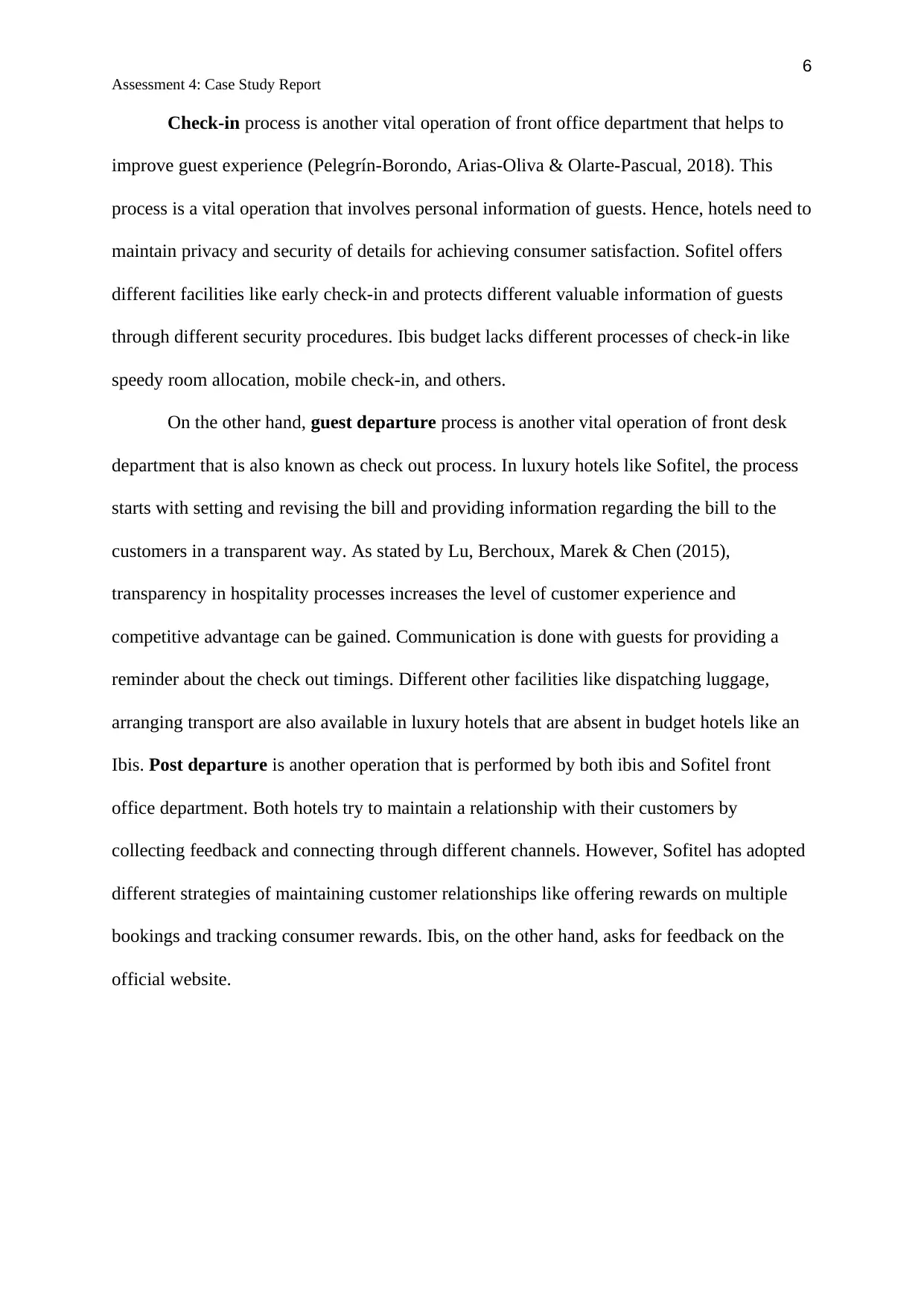
6
Assessment 4: Case Study Report
Check-in process is another vital operation of front office department that helps to
improve guest experience (Pelegrín-Borondo, Arias-Oliva & Olarte-Pascual, 2018). This
process is a vital operation that involves personal information of guests. Hence, hotels need to
maintain privacy and security of details for achieving consumer satisfaction. Sofitel offers
different facilities like early check-in and protects different valuable information of guests
through different security procedures. Ibis budget lacks different processes of check-in like
speedy room allocation, mobile check-in, and others.
On the other hand, guest departure process is another vital operation of front desk
department that is also known as check out process. In luxury hotels like Sofitel, the process
starts with setting and revising the bill and providing information regarding the bill to the
customers in a transparent way. As stated by Lu, Berchoux, Marek & Chen (2015),
transparency in hospitality processes increases the level of customer experience and
competitive advantage can be gained. Communication is done with guests for providing a
reminder about the check out timings. Different other facilities like dispatching luggage,
arranging transport are also available in luxury hotels that are absent in budget hotels like an
Ibis. Post departure is another operation that is performed by both ibis and Sofitel front
office department. Both hotels try to maintain a relationship with their customers by
collecting feedback and connecting through different channels. However, Sofitel has adopted
different strategies of maintaining customer relationships like offering rewards on multiple
bookings and tracking consumer rewards. Ibis, on the other hand, asks for feedback on the
official website.
Assessment 4: Case Study Report
Check-in process is another vital operation of front office department that helps to
improve guest experience (Pelegrín-Borondo, Arias-Oliva & Olarte-Pascual, 2018). This
process is a vital operation that involves personal information of guests. Hence, hotels need to
maintain privacy and security of details for achieving consumer satisfaction. Sofitel offers
different facilities like early check-in and protects different valuable information of guests
through different security procedures. Ibis budget lacks different processes of check-in like
speedy room allocation, mobile check-in, and others.
On the other hand, guest departure process is another vital operation of front desk
department that is also known as check out process. In luxury hotels like Sofitel, the process
starts with setting and revising the bill and providing information regarding the bill to the
customers in a transparent way. As stated by Lu, Berchoux, Marek & Chen (2015),
transparency in hospitality processes increases the level of customer experience and
competitive advantage can be gained. Communication is done with guests for providing a
reminder about the check out timings. Different other facilities like dispatching luggage,
arranging transport are also available in luxury hotels that are absent in budget hotels like an
Ibis. Post departure is another operation that is performed by both ibis and Sofitel front
office department. Both hotels try to maintain a relationship with their customers by
collecting feedback and connecting through different channels. However, Sofitel has adopted
different strategies of maintaining customer relationships like offering rewards on multiple
bookings and tracking consumer rewards. Ibis, on the other hand, asks for feedback on the
official website.
⊘ This is a preview!⊘
Do you want full access?
Subscribe today to unlock all pages.

Trusted by 1+ million students worldwide
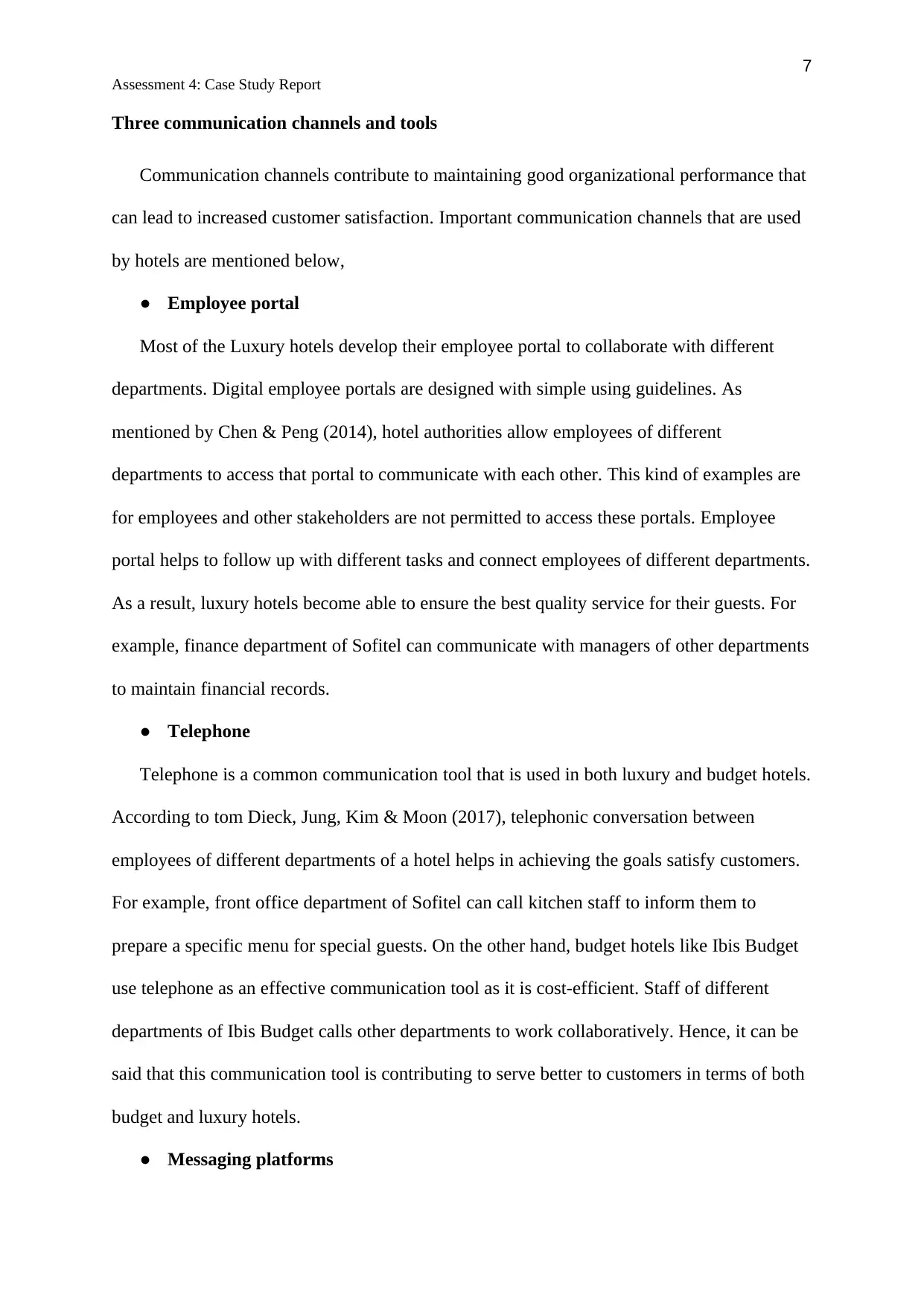
7
Assessment 4: Case Study Report
Three communication channels and tools
Communication channels contribute to maintaining good organizational performance that
can lead to increased customer satisfaction. Important communication channels that are used
by hotels are mentioned below,
● Employee portal
Most of the Luxury hotels develop their employee portal to collaborate with different
departments. Digital employee portals are designed with simple using guidelines. As
mentioned by Chen & Peng (2014), hotel authorities allow employees of different
departments to access that portal to communicate with each other. This kind of examples are
for employees and other stakeholders are not permitted to access these portals. Employee
portal helps to follow up with different tasks and connect employees of different departments.
As a result, luxury hotels become able to ensure the best quality service for their guests. For
example, finance department of Sofitel can communicate with managers of other departments
to maintain financial records.
● Telephone
Telephone is a common communication tool that is used in both luxury and budget hotels.
According to tom Dieck, Jung, Kim & Moon (2017), telephonic conversation between
employees of different departments of a hotel helps in achieving the goals satisfy customers.
For example, front office department of Sofitel can call kitchen staff to inform them to
prepare a specific menu for special guests. On the other hand, budget hotels like Ibis Budget
use telephone as an effective communication tool as it is cost-efficient. Staff of different
departments of Ibis Budget calls other departments to work collaboratively. Hence, it can be
said that this communication tool is contributing to serve better to customers in terms of both
budget and luxury hotels.
● Messaging platforms
Assessment 4: Case Study Report
Three communication channels and tools
Communication channels contribute to maintaining good organizational performance that
can lead to increased customer satisfaction. Important communication channels that are used
by hotels are mentioned below,
● Employee portal
Most of the Luxury hotels develop their employee portal to collaborate with different
departments. Digital employee portals are designed with simple using guidelines. As
mentioned by Chen & Peng (2014), hotel authorities allow employees of different
departments to access that portal to communicate with each other. This kind of examples are
for employees and other stakeholders are not permitted to access these portals. Employee
portal helps to follow up with different tasks and connect employees of different departments.
As a result, luxury hotels become able to ensure the best quality service for their guests. For
example, finance department of Sofitel can communicate with managers of other departments
to maintain financial records.
● Telephone
Telephone is a common communication tool that is used in both luxury and budget hotels.
According to tom Dieck, Jung, Kim & Moon (2017), telephonic conversation between
employees of different departments of a hotel helps in achieving the goals satisfy customers.
For example, front office department of Sofitel can call kitchen staff to inform them to
prepare a specific menu for special guests. On the other hand, budget hotels like Ibis Budget
use telephone as an effective communication tool as it is cost-efficient. Staff of different
departments of Ibis Budget calls other departments to work collaboratively. Hence, it can be
said that this communication tool is contributing to serve better to customers in terms of both
budget and luxury hotels.
● Messaging platforms
Paraphrase This Document
Need a fresh take? Get an instant paraphrase of this document with our AI Paraphraser
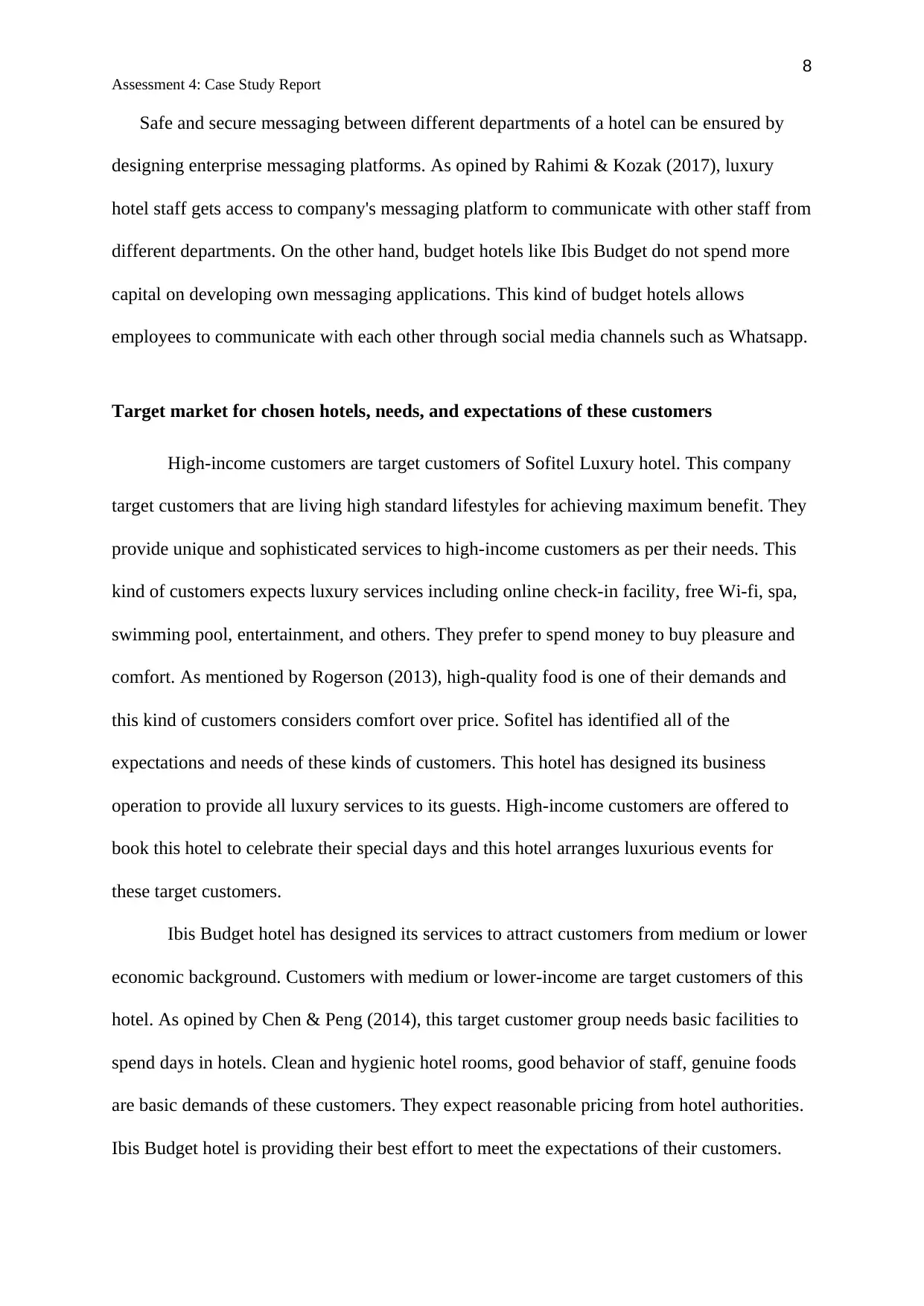
8
Assessment 4: Case Study Report
Safe and secure messaging between different departments of a hotel can be ensured by
designing enterprise messaging platforms. As opined by Rahimi & Kozak (2017), luxury
hotel staff gets access to company's messaging platform to communicate with other staff from
different departments. On the other hand, budget hotels like Ibis Budget do not spend more
capital on developing own messaging applications. This kind of budget hotels allows
employees to communicate with each other through social media channels such as Whatsapp.
Target market for chosen hotels, needs, and expectations of these customers
High-income customers are target customers of Sofitel Luxury hotel. This company
target customers that are living high standard lifestyles for achieving maximum benefit. They
provide unique and sophisticated services to high-income customers as per their needs. This
kind of customers expects luxury services including online check-in facility, free Wi-fi, spa,
swimming pool, entertainment, and others. They prefer to spend money to buy pleasure and
comfort. As mentioned by Rogerson (2013), high-quality food is one of their demands and
this kind of customers considers comfort over price. Sofitel has identified all of the
expectations and needs of these kinds of customers. This hotel has designed its business
operation to provide all luxury services to its guests. High-income customers are offered to
book this hotel to celebrate their special days and this hotel arranges luxurious events for
these target customers.
Ibis Budget hotel has designed its services to attract customers from medium or lower
economic background. Customers with medium or lower-income are target customers of this
hotel. As opined by Chen & Peng (2014), this target customer group needs basic facilities to
spend days in hotels. Clean and hygienic hotel rooms, good behavior of staff, genuine foods
are basic demands of these customers. They expect reasonable pricing from hotel authorities.
Ibis Budget hotel is providing their best effort to meet the expectations of their customers.
Assessment 4: Case Study Report
Safe and secure messaging between different departments of a hotel can be ensured by
designing enterprise messaging platforms. As opined by Rahimi & Kozak (2017), luxury
hotel staff gets access to company's messaging platform to communicate with other staff from
different departments. On the other hand, budget hotels like Ibis Budget do not spend more
capital on developing own messaging applications. This kind of budget hotels allows
employees to communicate with each other through social media channels such as Whatsapp.
Target market for chosen hotels, needs, and expectations of these customers
High-income customers are target customers of Sofitel Luxury hotel. This company
target customers that are living high standard lifestyles for achieving maximum benefit. They
provide unique and sophisticated services to high-income customers as per their needs. This
kind of customers expects luxury services including online check-in facility, free Wi-fi, spa,
swimming pool, entertainment, and others. They prefer to spend money to buy pleasure and
comfort. As mentioned by Rogerson (2013), high-quality food is one of their demands and
this kind of customers considers comfort over price. Sofitel has identified all of the
expectations and needs of these kinds of customers. This hotel has designed its business
operation to provide all luxury services to its guests. High-income customers are offered to
book this hotel to celebrate their special days and this hotel arranges luxurious events for
these target customers.
Ibis Budget hotel has designed its services to attract customers from medium or lower
economic background. Customers with medium or lower-income are target customers of this
hotel. As opined by Chen & Peng (2014), this target customer group needs basic facilities to
spend days in hotels. Clean and hygienic hotel rooms, good behavior of staff, genuine foods
are basic demands of these customers. They expect reasonable pricing from hotel authorities.
Ibis Budget hotel is providing their best effort to meet the expectations of their customers.
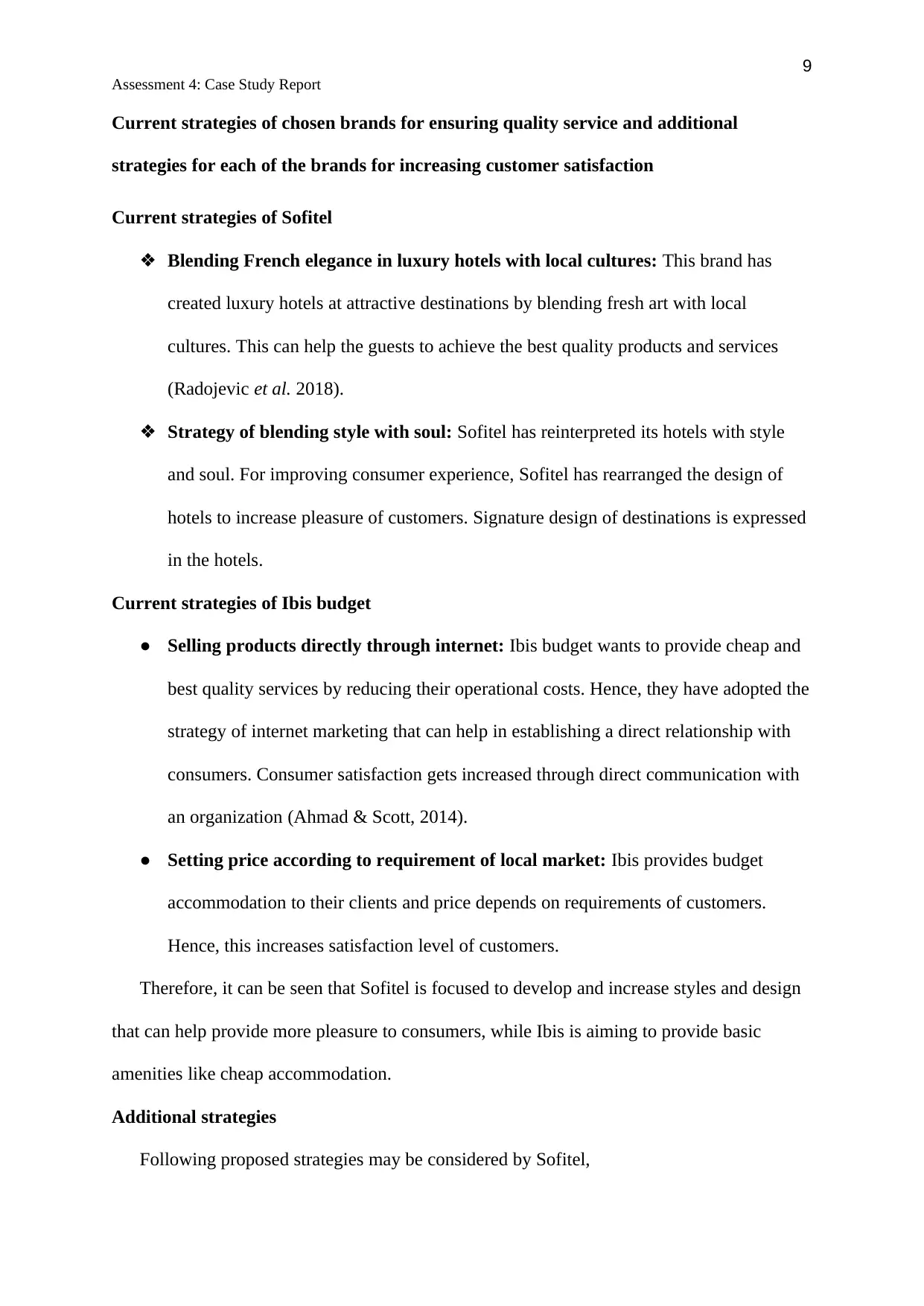
9
Assessment 4: Case Study Report
Current strategies of chosen brands for ensuring quality service and additional
strategies for each of the brands for increasing customer satisfaction
Current strategies of Sofitel
❖ Blending French elegance in luxury hotels with local cultures: This brand has
created luxury hotels at attractive destinations by blending fresh art with local
cultures. This can help the guests to achieve the best quality products and services
(Radojevic et al. 2018).
❖ Strategy of blending style with soul: Sofitel has reinterpreted its hotels with style
and soul. For improving consumer experience, Sofitel has rearranged the design of
hotels to increase pleasure of customers. Signature design of destinations is expressed
in the hotels.
Current strategies of Ibis budget
● Selling products directly through internet: Ibis budget wants to provide cheap and
best quality services by reducing their operational costs. Hence, they have adopted the
strategy of internet marketing that can help in establishing a direct relationship with
consumers. Consumer satisfaction gets increased through direct communication with
an organization (Ahmad & Scott, 2014).
● Setting price according to requirement of local market: Ibis provides budget
accommodation to their clients and price depends on requirements of customers.
Hence, this increases satisfaction level of customers.
Therefore, it can be seen that Sofitel is focused to develop and increase styles and design
that can help provide more pleasure to consumers, while Ibis is aiming to provide basic
amenities like cheap accommodation.
Additional strategies
Following proposed strategies may be considered by Sofitel,
Assessment 4: Case Study Report
Current strategies of chosen brands for ensuring quality service and additional
strategies for each of the brands for increasing customer satisfaction
Current strategies of Sofitel
❖ Blending French elegance in luxury hotels with local cultures: This brand has
created luxury hotels at attractive destinations by blending fresh art with local
cultures. This can help the guests to achieve the best quality products and services
(Radojevic et al. 2018).
❖ Strategy of blending style with soul: Sofitel has reinterpreted its hotels with style
and soul. For improving consumer experience, Sofitel has rearranged the design of
hotels to increase pleasure of customers. Signature design of destinations is expressed
in the hotels.
Current strategies of Ibis budget
● Selling products directly through internet: Ibis budget wants to provide cheap and
best quality services by reducing their operational costs. Hence, they have adopted the
strategy of internet marketing that can help in establishing a direct relationship with
consumers. Consumer satisfaction gets increased through direct communication with
an organization (Ahmad & Scott, 2014).
● Setting price according to requirement of local market: Ibis provides budget
accommodation to their clients and price depends on requirements of customers.
Hence, this increases satisfaction level of customers.
Therefore, it can be seen that Sofitel is focused to develop and increase styles and design
that can help provide more pleasure to consumers, while Ibis is aiming to provide basic
amenities like cheap accommodation.
Additional strategies
Following proposed strategies may be considered by Sofitel,
⊘ This is a preview!⊘
Do you want full access?
Subscribe today to unlock all pages.

Trusted by 1+ million students worldwide
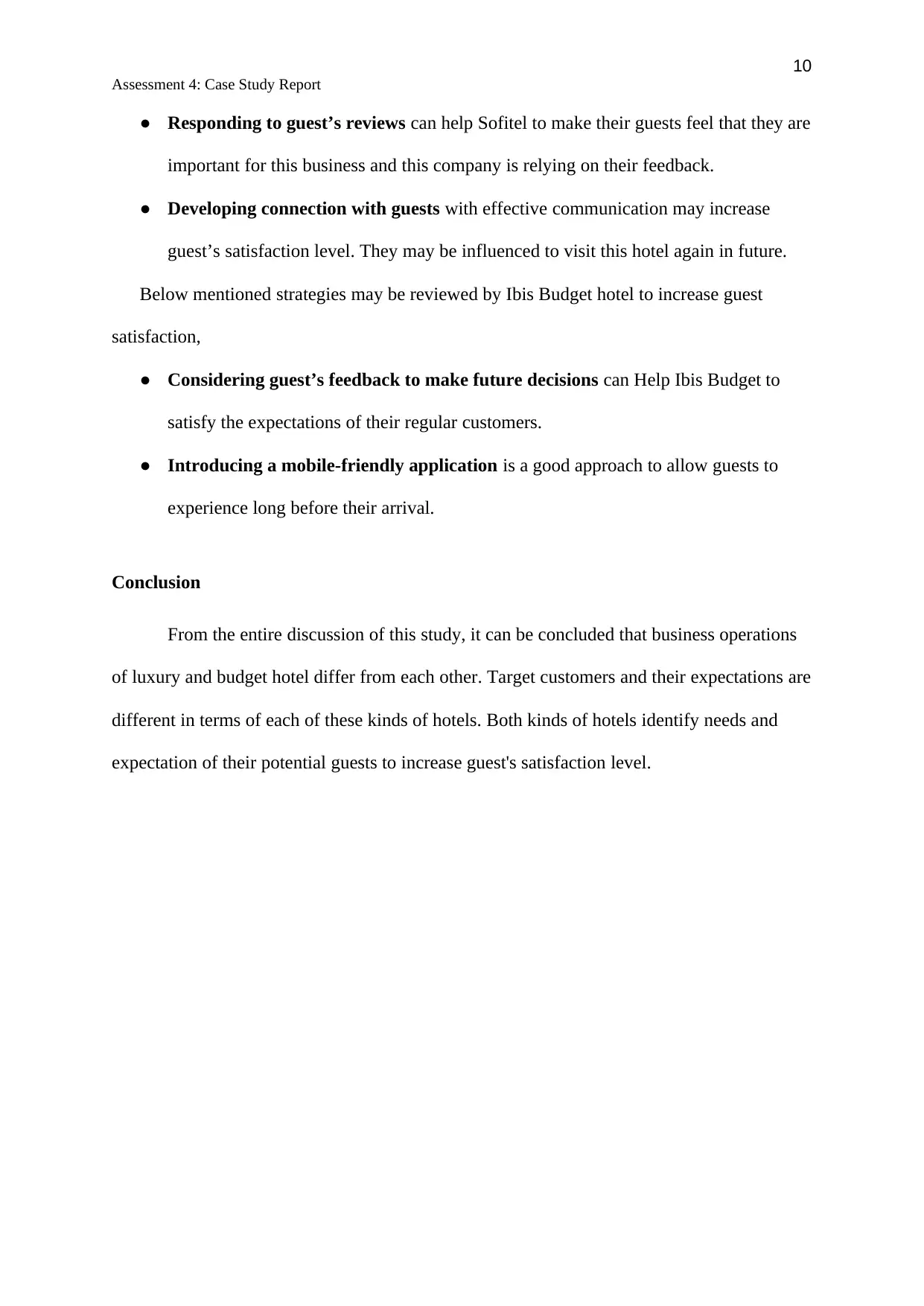
10
Assessment 4: Case Study Report
● Responding to guest’s reviews can help Sofitel to make their guests feel that they are
important for this business and this company is relying on their feedback.
● Developing connection with guests with effective communication may increase
guest’s satisfaction level. They may be influenced to visit this hotel again in future.
Below mentioned strategies may be reviewed by Ibis Budget hotel to increase guest
satisfaction,
● Considering guest’s feedback to make future decisions can Help Ibis Budget to
satisfy the expectations of their regular customers.
● Introducing a mobile-friendly application is a good approach to allow guests to
experience long before their arrival.
Conclusion
From the entire discussion of this study, it can be concluded that business operations
of luxury and budget hotel differ from each other. Target customers and their expectations are
different in terms of each of these kinds of hotels. Both kinds of hotels identify needs and
expectation of their potential guests to increase guest's satisfaction level.
Assessment 4: Case Study Report
● Responding to guest’s reviews can help Sofitel to make their guests feel that they are
important for this business and this company is relying on their feedback.
● Developing connection with guests with effective communication may increase
guest’s satisfaction level. They may be influenced to visit this hotel again in future.
Below mentioned strategies may be reviewed by Ibis Budget hotel to increase guest
satisfaction,
● Considering guest’s feedback to make future decisions can Help Ibis Budget to
satisfy the expectations of their regular customers.
● Introducing a mobile-friendly application is a good approach to allow guests to
experience long before their arrival.
Conclusion
From the entire discussion of this study, it can be concluded that business operations
of luxury and budget hotel differ from each other. Target customers and their expectations are
different in terms of each of these kinds of hotels. Both kinds of hotels identify needs and
expectation of their potential guests to increase guest's satisfaction level.
Paraphrase This Document
Need a fresh take? Get an instant paraphrase of this document with our AI Paraphraser
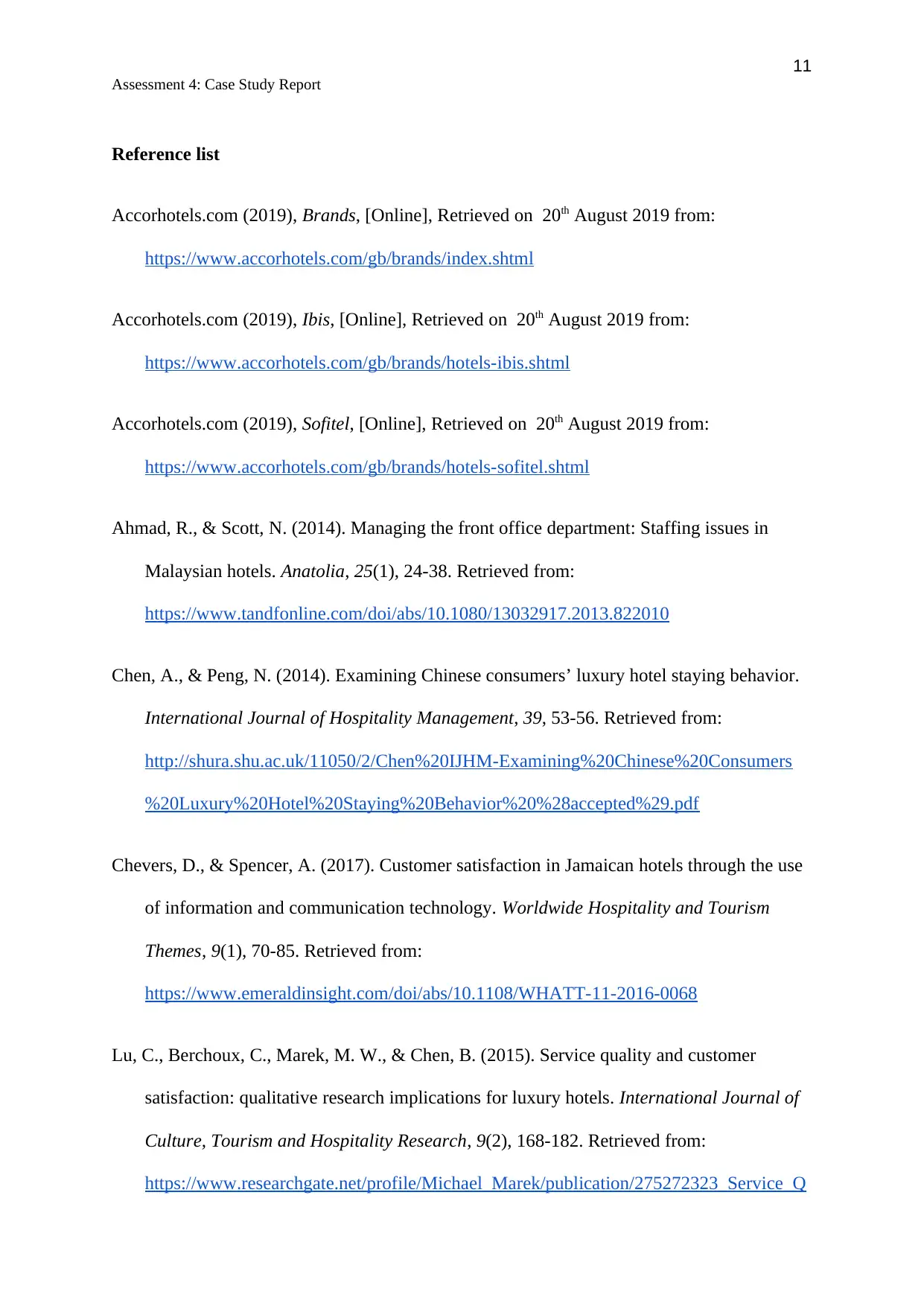
11
Assessment 4: Case Study Report
Reference list
Accorhotels.com (2019), Brands, [Online], Retrieved on 20th August 2019 from:
https://www.accorhotels.com/gb/brands/index.shtml
Accorhotels.com (2019), Ibis, [Online], Retrieved on 20th August 2019 from:
https://www.accorhotels.com/gb/brands/hotels-ibis.shtml
Accorhotels.com (2019), Sofitel, [Online], Retrieved on 20th August 2019 from:
https://www.accorhotels.com/gb/brands/hotels-sofitel.shtml
Ahmad, R., & Scott, N. (2014). Managing the front office department: Staffing issues in
Malaysian hotels. Anatolia, 25(1), 24-38. Retrieved from:
https://www.tandfonline.com/doi/abs/10.1080/13032917.2013.822010
Chen, A., & Peng, N. (2014). Examining Chinese consumers’ luxury hotel staying behavior.
International Journal of Hospitality Management, 39, 53-56. Retrieved from:
http://shura.shu.ac.uk/11050/2/Chen%20IJHM-Examining%20Chinese%20Consumers
%20Luxury%20Hotel%20Staying%20Behavior%20%28accepted%29.pdf
Chevers, D., & Spencer, A. (2017). Customer satisfaction in Jamaican hotels through the use
of information and communication technology. Worldwide Hospitality and Tourism
Themes, 9(1), 70-85. Retrieved from:
https://www.emeraldinsight.com/doi/abs/10.1108/WHATT-11-2016-0068
Lu, C., Berchoux, C., Marek, M. W., & Chen, B. (2015). Service quality and customer
satisfaction: qualitative research implications for luxury hotels. International Journal of
Culture, Tourism and Hospitality Research, 9(2), 168-182. Retrieved from:
https://www.researchgate.net/profile/Michael_Marek/publication/275272323_Service_Q
Assessment 4: Case Study Report
Reference list
Accorhotels.com (2019), Brands, [Online], Retrieved on 20th August 2019 from:
https://www.accorhotels.com/gb/brands/index.shtml
Accorhotels.com (2019), Ibis, [Online], Retrieved on 20th August 2019 from:
https://www.accorhotels.com/gb/brands/hotels-ibis.shtml
Accorhotels.com (2019), Sofitel, [Online], Retrieved on 20th August 2019 from:
https://www.accorhotels.com/gb/brands/hotels-sofitel.shtml
Ahmad, R., & Scott, N. (2014). Managing the front office department: Staffing issues in
Malaysian hotels. Anatolia, 25(1), 24-38. Retrieved from:
https://www.tandfonline.com/doi/abs/10.1080/13032917.2013.822010
Chen, A., & Peng, N. (2014). Examining Chinese consumers’ luxury hotel staying behavior.
International Journal of Hospitality Management, 39, 53-56. Retrieved from:
http://shura.shu.ac.uk/11050/2/Chen%20IJHM-Examining%20Chinese%20Consumers
%20Luxury%20Hotel%20Staying%20Behavior%20%28accepted%29.pdf
Chevers, D., & Spencer, A. (2017). Customer satisfaction in Jamaican hotels through the use
of information and communication technology. Worldwide Hospitality and Tourism
Themes, 9(1), 70-85. Retrieved from:
https://www.emeraldinsight.com/doi/abs/10.1108/WHATT-11-2016-0068
Lu, C., Berchoux, C., Marek, M. W., & Chen, B. (2015). Service quality and customer
satisfaction: qualitative research implications for luxury hotels. International Journal of
Culture, Tourism and Hospitality Research, 9(2), 168-182. Retrieved from:
https://www.researchgate.net/profile/Michael_Marek/publication/275272323_Service_Q
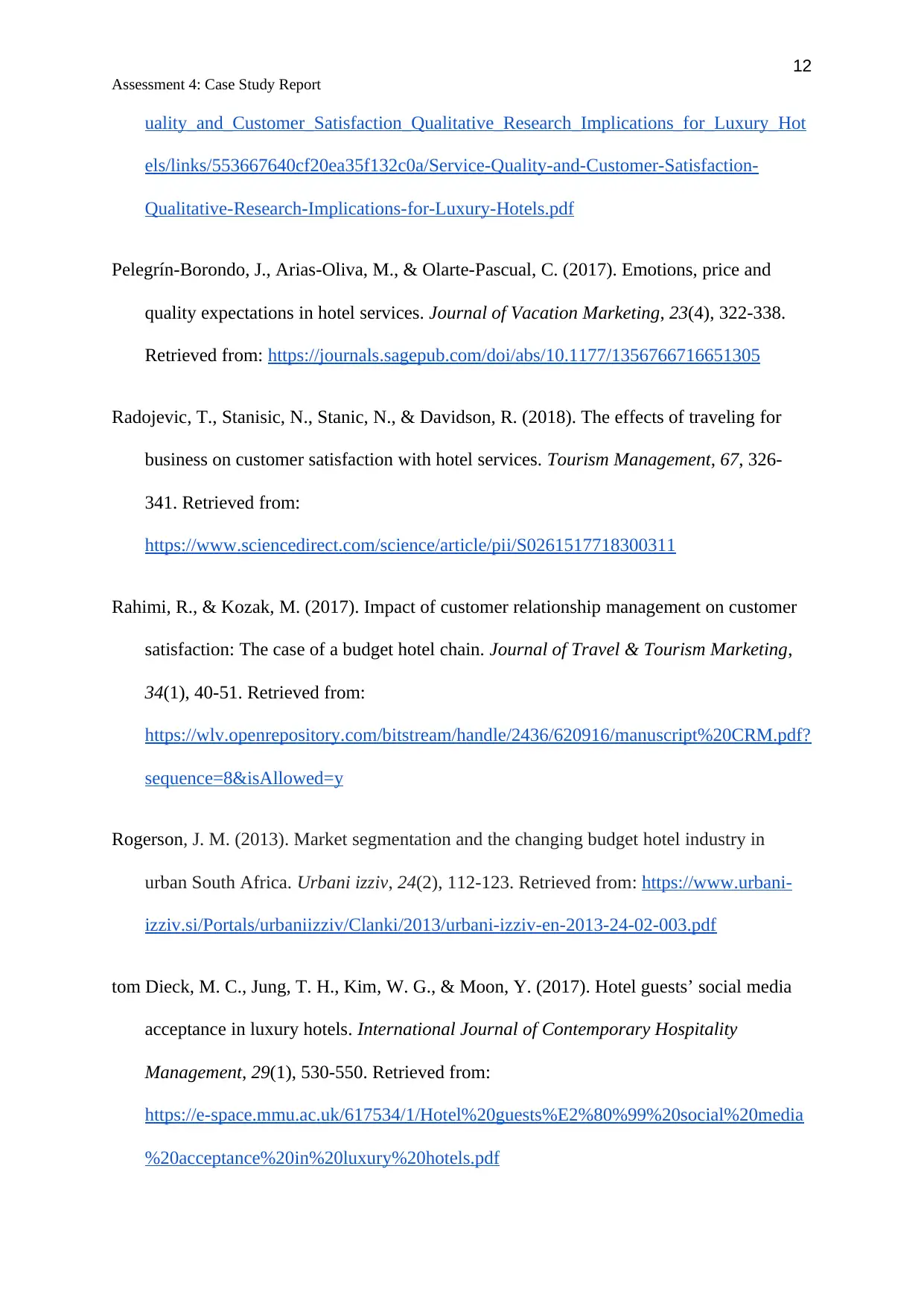
12
Assessment 4: Case Study Report
uality_and_Customer_Satisfaction_Qualitative_Research_Implications_for_Luxury_Hot
els/links/553667640cf20ea35f132c0a/Service-Quality-and-Customer-Satisfaction-
Qualitative-Research-Implications-for-Luxury-Hotels.pdf
Pelegrín-Borondo, J., Arias-Oliva, M., & Olarte-Pascual, C. (2017). Emotions, price and
quality expectations in hotel services. Journal of Vacation Marketing, 23(4), 322-338.
Retrieved from: https://journals.sagepub.com/doi/abs/10.1177/1356766716651305
Radojevic, T., Stanisic, N., Stanic, N., & Davidson, R. (2018). The effects of traveling for
business on customer satisfaction with hotel services. Tourism Management, 67, 326-
341. Retrieved from:
https://www.sciencedirect.com/science/article/pii/S0261517718300311
Rahimi, R., & Kozak, M. (2017). Impact of customer relationship management on customer
satisfaction: The case of a budget hotel chain. Journal of Travel & Tourism Marketing,
34(1), 40-51. Retrieved from:
https://wlv.openrepository.com/bitstream/handle/2436/620916/manuscript%20CRM.pdf?
sequence=8&isAllowed=y
Rogerson, J. M. (2013). Market segmentation and the changing budget hotel industry in
urban South Africa. Urbani izziv, 24(2), 112-123. Retrieved from: https://www.urbani-
izziv.si/Portals/urbaniizziv/Clanki/2013/urbani-izziv-en-2013-24-02-003.pdf
tom Dieck, M. C., Jung, T. H., Kim, W. G., & Moon, Y. (2017). Hotel guests’ social media
acceptance in luxury hotels. International Journal of Contemporary Hospitality
Management, 29(1), 530-550. Retrieved from:
https://e-space.mmu.ac.uk/617534/1/Hotel%20guests%E2%80%99%20social%20media
%20acceptance%20in%20luxury%20hotels.pdf
Assessment 4: Case Study Report
uality_and_Customer_Satisfaction_Qualitative_Research_Implications_for_Luxury_Hot
els/links/553667640cf20ea35f132c0a/Service-Quality-and-Customer-Satisfaction-
Qualitative-Research-Implications-for-Luxury-Hotels.pdf
Pelegrín-Borondo, J., Arias-Oliva, M., & Olarte-Pascual, C. (2017). Emotions, price and
quality expectations in hotel services. Journal of Vacation Marketing, 23(4), 322-338.
Retrieved from: https://journals.sagepub.com/doi/abs/10.1177/1356766716651305
Radojevic, T., Stanisic, N., Stanic, N., & Davidson, R. (2018). The effects of traveling for
business on customer satisfaction with hotel services. Tourism Management, 67, 326-
341. Retrieved from:
https://www.sciencedirect.com/science/article/pii/S0261517718300311
Rahimi, R., & Kozak, M. (2017). Impact of customer relationship management on customer
satisfaction: The case of a budget hotel chain. Journal of Travel & Tourism Marketing,
34(1), 40-51. Retrieved from:
https://wlv.openrepository.com/bitstream/handle/2436/620916/manuscript%20CRM.pdf?
sequence=8&isAllowed=y
Rogerson, J. M. (2013). Market segmentation and the changing budget hotel industry in
urban South Africa. Urbani izziv, 24(2), 112-123. Retrieved from: https://www.urbani-
izziv.si/Portals/urbaniizziv/Clanki/2013/urbani-izziv-en-2013-24-02-003.pdf
tom Dieck, M. C., Jung, T. H., Kim, W. G., & Moon, Y. (2017). Hotel guests’ social media
acceptance in luxury hotels. International Journal of Contemporary Hospitality
Management, 29(1), 530-550. Retrieved from:
https://e-space.mmu.ac.uk/617534/1/Hotel%20guests%E2%80%99%20social%20media
%20acceptance%20in%20luxury%20hotels.pdf
⊘ This is a preview!⊘
Do you want full access?
Subscribe today to unlock all pages.

Trusted by 1+ million students worldwide
1 out of 13
Related Documents
Your All-in-One AI-Powered Toolkit for Academic Success.
+13062052269
info@desklib.com
Available 24*7 on WhatsApp / Email
![[object Object]](/_next/static/media/star-bottom.7253800d.svg)
Unlock your academic potential
Copyright © 2020–2026 A2Z Services. All Rights Reserved. Developed and managed by ZUCOL.





